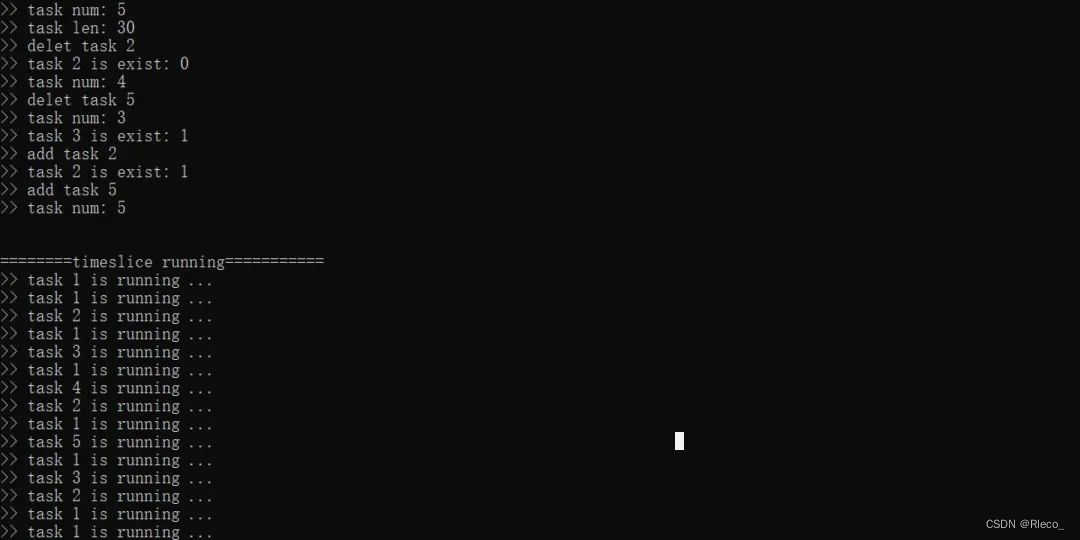-
【嵌入式项目应用】__一款简单易用的嵌入式软件程序框架_时间片轮询框架
目录
前言
大家好,今天分享一篇单片机程序框架的文章。
一、程序框架的重要性
很多人尤其是初学者在写代码的时候往往都是想一点写一点,最开始没有一个整体的规划,导致后面代码越写越乱,bug不断。
最终代码跑起来看似没有问题(有可能也真的没有问题),但是要加一个功能的时候会浪费大量的时间,甚至导致整个代码的崩溃。
所以,在一个项目开始的时候多花一些时间在代码的架构设计上是十分有必要的。代码架构确定好了之后你会发现敲代码的时候会特别快,并且在后期调试的时候也不会像无头苍蝇一样胡乱找问题。当然,调试也是一门技术。
在学习实时操作系统的过程中,发现实时操作系统框架与个人的业务代码之间的耦合性就非常低,都是只需要将业务代码通过一定的接口函数注册好后就交给操作系统托管了,十分方便。
但是操作系统的调度过于复杂,这里就使用操作系统的思维方式来重构这个时间片轮询框架。实现该框架的完全解耦,用户只需要包含头文件,并且在使用过程中不需要改动已经写好的库文件。
二、程序实例
首先来个demo,该demo是使用电脑开两个线程:一个线程模拟单片机的定时器中断产生时间片轮询个时钟,另一个线程则模拟主函数中一直运行的时间片轮询调度程序。
- #include
- #include
- #include
- #include "timeslice.h"
- // 创建5个任务对象
- TimesilceTaskObj task_1, task_2, task_3, task_4, task_5;
- // 具体的任务函数
- void task1_hdl()
- {
- printf(">> task 1 is running ...\n");
- }
- void task2_hdl()
- {
- printf(">> task 2 is running ...\n");
- }
- void task3_hdl()
- {
- printf(">> task 3 is running ...\n");
- }
- void task4_hdl()
- {
- printf(">> task 4 is running ...\n");
- }
- void task5_hdl()
- {
- printf(">> task 5 is running ...\n");
- }
- // 初始化任务对象,并且将任务添加到时间片轮询调度中
- void task_init()
- {
- timeslice_task_init(&task_1, task1_hdl, 1, 10);
- timeslice_task_init(&task_2, task2_hdl, 2, 20);
- timeslice_task_init(&task_3, task3_hdl, 3, 30);
- timeslice_task_init(&task_4, task4_hdl, 4, 40);
- timeslice_task_init(&task_5, task5_hdl, 5, 50);
- timeslice_task_add(&task_1);
- timeslice_task_add(&task_2);
- timeslice_task_add(&task_3);
- timeslice_task_add(&task_4);
- timeslice_task_add(&task_5);
- }
- // 开两个线程模拟在单片机上的运行过程
- void timeslice_exec_thread()
- {
- while (true)
- {
- timeslice_exec();
- }
- }
- void timeslice_tick_thread()
- {
- while (true)
- {
- timeslice_tick();
- Sleep(10);
- }
- }
- int main()
- {
- task_init();
- printf(">> task num: %d\n", timeslice_get_task_num());
- printf(">> task len: %d\n", timeslice_get_task_timeslice_len(&task_3));
- timeslice_task_del(&task_2);
- printf(">> delet task 2\n");
- printf(">> task 2 is exist: %d\n", timeslice_task_isexist(&task_2));
- printf(">> task num: %d\n", timeslice_get_task_num());
- timeslice_task_del(&task_5);
- printf(">> delet task 5\n");
- printf(">> task num: %d\n", timeslice_get_task_num());
- printf(">> task 3 is exist: %d\n", timeslice_task_isexist(&task_3));
- timeslice_task_add(&task_2);
- printf(">> add task 2\n");
- printf(">> task 2 is exist: %d\n", timeslice_task_isexist(&task_2));
- timeslice_task_add(&task_5);
- printf(">> add task 5\n");
- printf(">> task num: %d\n", timeslice_get_task_num());
- printf("\n\n========timeslice running===========\n");
- std::thread thread_1(timeslice_exec_thread);
- std::thread thread_2(timeslice_tick_thread);
- thread_1.join();
- thread_2.join();
- return 0;
- }

由以上例子可见,这个框架使用十分方便,甚至可以完全不知道其原理,仅仅通过几个简单的接口就可以迅速创建任务并加入到时间片轮询的框架中,十分好用。
三、时间片轮询框架
其实该部分主要使用了面向对象的思维,使用结构体作为对象,并使用结构体指针作为参数传递,这样作可以节省资源,并且有着极高的运行效率。
其中最难的部分是侵入式链表的使用,这种链表在一些操作系统内核中使用十分广泛,这里是参考RT-Thread实时操作系统中的侵入式链表实现。
1. "*.h"头文件
- #ifndef _TIMESLICE_H
- #define _TIMESLICE_H
- #include "./list.h"
- typedef enum {
- TASK_STOP,
- TASK_RUN
- } IsTaskRun;
- typedef struct timesilce
- {
- unsigned int id;
- void (*task_hdl)(void);
- IsTaskRun is_run;
- unsigned int timer;
- unsigned int timeslice_len;
- ListObj timeslice_task_list;
- } TimesilceTaskObj;
- void timeslice_exec(void);
- void timeslice_tick(void);
- void timeslice_task_init(TimesilceTaskObj* obj, void (*task_hdl)(void), unsigned int id, unsigned int timeslice_len);
- void timeslice_task_add(TimesilceTaskObj* obj);
- void timeslice_task_del(TimesilceTaskObj* obj);
- unsigned int timeslice_get_task_timeslice_len(TimesilceTaskObj* obj);
- unsigned int timeslice_get_task_num(void);
- unsigned char timeslice_task_isexist(TimesilceTaskObj* obj);
- #endif
2. "*.c"文件
- #include "./timeslice.h"
- static LIST_HEAD(timeslice_task_list);
- void timeslice_exec()
- {
- ListObj* node;
- TimesilceTaskObj* task;
- list_for_each(node, ×lice_task_list)
- {
- task = list_entry(node, TimesilceTaskObj, timeslice_task_list);
- if (task->is_run == TASK_RUN)
- {
- task->task_hdl();
- task->is_run = TASK_STOP;
- }
- }
- }
- void timeslice_tick()
- {
- ListObj* node;
- TimesilceTaskObj* task;
- list_for_each(node, ×lice_task_list)
- {
- task = list_entry(node, TimesilceTaskObj, timeslice_task_list);
- if (task->timer != 0)
- {
- task->timer--;
- if (task->timer == 0)
- {
- task->is_run = TASK_RUN;
- task->timer = task->timeslice_len;
- }
- }
- }
- }
- unsigned int timeslice_get_task_num()
- {
- return list_len(×lice_task_list);
- }
- void timeslice_task_init(TimesilceTaskObj* obj, void (*task_hdl)(void), unsigned int id, unsigned int timeslice_len)
- {
- obj->id = id;
- obj->is_run = TASK_STOP;
- obj->task_hdl = task_hdl;
- obj->timer = timeslice_len;
- obj->timeslice_len = timeslice_len;
- }
- void timeslice_task_add(TimesilceTaskObj* obj)
- {
- list_insert_before(×lice_task_list, &obj->timeslice_task_list);
- }
- void timeslice_task_del(TimesilceTaskObj* obj)
- {
- if (timeslice_task_isexist(obj))
- list_remove(&obj->timeslice_task_list);
- else
- return;
- }
- unsigned char timeslice_task_isexist(TimesilceTaskObj* obj)
- {
- unsigned char isexist = 0;
- ListObj* node;
- TimesilceTaskObj* task;
- list_for_each(node, ×lice_task_list)
- {
- task = list_entry(node, TimesilceTaskObj, timeslice_task_list);
- if (obj->id == task->id)
- isexist = 1;
- }
- return isexist;
- }
- unsigned int timeslice_get_task_timeslice_len(TimesilceTaskObj* obj)
- {
- return obj->timeslice_len;
- }
四、底层侵入式双向链表
1. "*.h"头文件
- #ifndef _LIST_H
- #define _LIST_H
- #define offset_of(type, member) (unsigned long) &((type*)0)->member
- #define container_of(ptr, type, member) ((type *)((char *)(ptr) - offset_of(type, member)))
- typedef struct list_structure
- {
- struct list_structure* next;
- struct list_structure* prev;
- } ListObj;
- #define LIST_HEAD_INIT(name) {&(name), &(name)}
- #define LIST_HEAD(name) ListObj name = LIST_HEAD_INIT(name)
- void list_init(ListObj* list);
- void list_insert_after(ListObj* list, ListObj* node);
- void list_insert_before(ListObj* list, ListObj* node);
- void list_remove(ListObj* node);
- int list_isempty(const ListObj* list);
- unsigned int list_len(const ListObj* list);
- #define list_entry(node, type, member) \
- container_of(node, type, member)
- #define list_for_each(pos, head) \
- for (pos = (head)->next; pos != (head); pos = pos->next)
- #define list_for_each_safe(pos, n, head) \
- for (pos = (head)->next, n = pos->next; pos != (head); \
- pos = n, n = pos->next)
- #endif
2. "*.c"文件
- #include "list.h"
- void list_init(ListObj* list)
- {
- list->next = list->prev = list;
- }
- void list_insert_after(ListObj* list, ListObj* node)
- {
- list->next->prev = node;
- node->next = list->next;
- list->next = node;
- node->prev = list;
- }
- void list_insert_before(ListObj* list, ListObj* node)
- {
- list->prev->next = node;
- node->prev = list->prev;
- list->prev = node;
- node->next = list;
- }
- void list_remove(ListObj* node)
- {
- node->next->prev = node->prev;
- node->prev->next = node->next;
- node->next = node->prev = node;
- }
- int list_isempty(const ListObj* list)
- {
- return list->next == list;
- }
- unsigned int list_len(const ListObj* list)
- {
- unsigned int len = 0;
- const ListObj* p = list;
- while (p->next != list)
- {
- p = p->next;
- len++;
- }
- return len;
- }
到此,一个全新的,完全解耦的,十分方便易用时间片轮询框架完成。
(* ̄︶ ̄)创作不易!期待你们的 点赞、收藏和评论喔。
-
相关阅读:
超六成专科生的月薪不足5000元?网友:本科和研究生也是
C++之map_set的使用
Fast semi-supervised learning with anchor graph for large
非零基础自学Java (老师:韩顺平) 第13章 常用类 13.1 包装类
消费力回落,名创优品大涨:深耕兴趣消费实现逆势增长
C++ 类和对象 从入门到超神(下)
centos7桌面版下载向日葵和todesk
Web学习笔记-CSS
gbase 8s 按时间点恢复
未归一化导致Dead ReLU的悲剧
- 原文地址:https://blog.csdn.net/weixin_44807874/article/details/134052932
